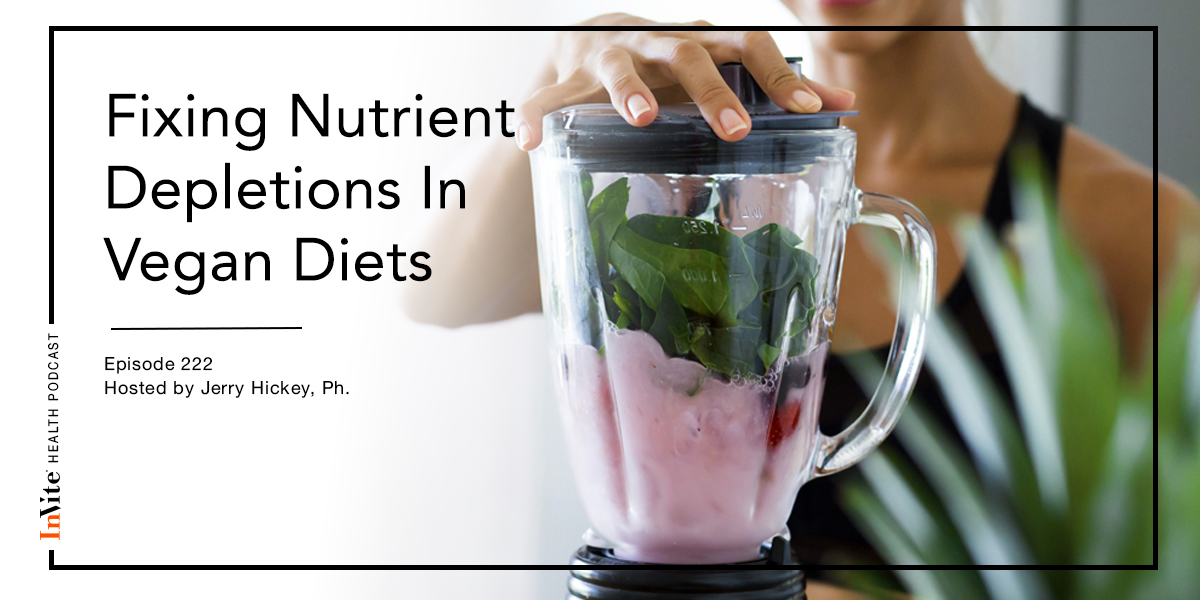Fixing Nutrient Depletions In Vegan Diets – InVite Health Podcast, Episode 222

vegan
Invite Health Podcast, Episode hosted by Jerry Hickey. Ph
Subscribe Today!
Vegan diets are becoming more and more popular and they’re pretty healthy. They’re high in fiber, which is good for the colon and also feed the healthy probiotic bacteria in your microbiome. They’re high in folate, a B vitamin that’s been known to lower the risk of heart disease and certain cancers. They’re high in Vitamin C and Vitamin E, which are very protective for your vision, memory and brain. They’re high in Vitamin K, which keeps your blood vessels walls clean and free of plaque, but also builds strong bones. They have potassium and magnesium that help keep you alkaline and do so many wonderful things for the human body. They also have carotenoids and polyphenols and are low in saturated fats, which is the major artery-clogger that leads to heart disease. There’s a strong tendency in vegans to be thinner and to have lower cholesterol and blood pressure and a better microbiome. However, eliminating all animal products from your diet does increase your risk of certain nutritional deficiencies. But these can be fixed.
Nutrient concerns for vegans
Specific concerns for vegans include Vitamin B12, Vitamin D, calcium, omega-3 fatty acids, and sometimes iron and zinc. My first consideration is the omega-3 fatty acids. Normally, people get omega-3 fatty acids from a krill oil or fish oil supplement or from eating fish or mussels. So what do vegans do? There are sources of omega-3 fatty acids, such as walnut and flaxseed, that are commendable, but also algae-sourced omega-3 fatty acids from spirulina and chlorela. Of course, these foods have many other good nutrients in them. For instance, flaxseed is a good source of omega-3, omega-6 and omega-9 fatty acids. The omega-9 are similar to the fatty acids in olives. Flaxseed is also a good source of protein and it’s also a good source of lignans, which have some real benefit for your heart health and lowering cholesterol.
Do You Have A Nutrient Deficiency? – InVite Health Podcast, Episode 201. Listen Now >>
Mostly, when you eat these vegan foods, you’re getting alpha-Linolenic acid (ALA). New research shows that, just like fish oils, alpha-Linolenic acid is very protective for the heart. It doesn’t really convert to EPA that well. EPA is a fatty acid in the brain that’s really protective for the brain and protective for your vision. It transforms really poorly into DHA, which is the other major oil in fish oil capsules. DHA is very important for your memory and for heart health. There is some evidence that if you have some turmeric, you can translate the alpha-Linolenic acid into some EPA and DHA. However, just getting the alpha-Linolenic acid is good, but if you can get supplements of algal-sourced DHA, it could be very good for your brain.
Beyond the omega-3 fatty acids that are replacable, Vitamin B12 may be an issue. B12 is needed for healthy red blood cells. You need it to make hemoglobin, which is the oxygen-carrying component of your red blood cells. If you lack B12, it can affect your brain and studies show that this may even cause your brain to shrink and go into mild cognitive impairment. You can also become weak and numb. It affects your muscles and nerves. You can also develop high levels of homocysteine, which is an amino acid intermediary in your blood that, when found in high concentrations, is connected to depression and damage in the back of the eyes.
Fending Off Fall and Winter Weight Gain – InVite Health Podcast, Episode 203. Listen Now >>
Vitamin D3 is also an issue. Usually, Vitamin D3 is made out of lanolin that they eradiate. That’s not an issue because that’s the same way it’s made in your skin. The problem is that D2 doesn’t seem to be as effective nor do its effects last as long in the human body. This is the kind of Vitamin D you receive when you eat a vegan diet. Vitamin D3 seems to be superior. My recommendation is to eat more mushrooms.
Tune into the full podcast episode to hear more of Jerry’s recommendations for vegans.
Thank you for tuning in to the Invite Health Podcast. You can find all of our episodes for free wherever you listen to podcasts or by visiting www.invitehealth.com/podcast. Make sure you subscribe and leave us a review! Follow us on Facebook, Twitter and Instagram at Invite Health today. We’ll see you next time on another episode of the Invite Health Podcast.


